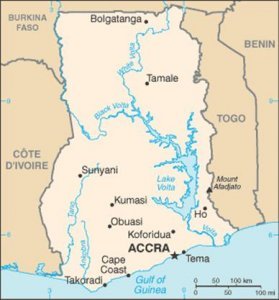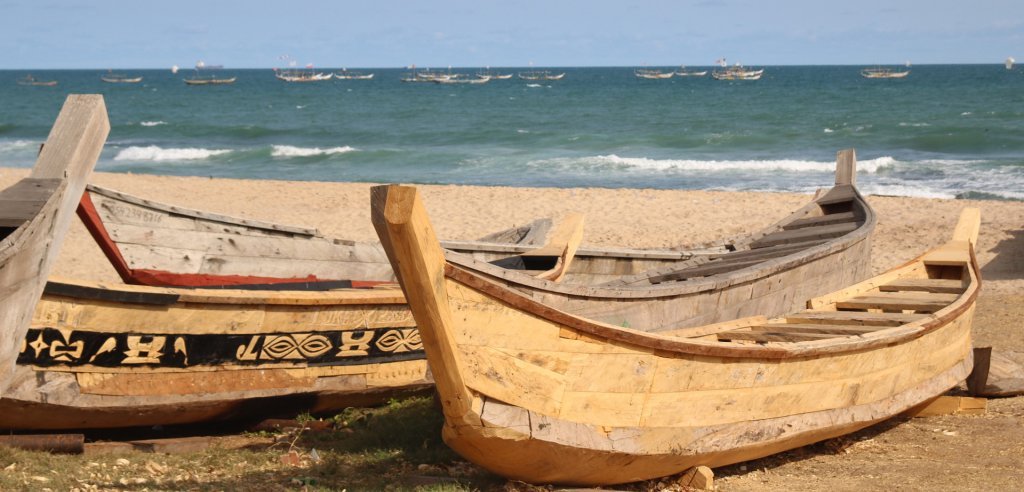
GEOGRAPHY
Ghana is a country in West Africa, along the Gulf of Guinea, just a few degrees north of the equator. Ghana, which lies in the center of the West African coast, shares 1,300 miles of land borders with the three French-speaking nations of Burkina Faso to the north, Côte d’Ivoire to the west, and Togo to the east. To the south are the Gulf of Guinea and the Atlantic Ocean. With a total area of 92,098² miles, Ghana is about the size of the United Kingdom, or slightly smaller than Oregon. Its southernmost coast at Cape Three Points is 4° 30′ north of the equator. From here, the country extends inland for some 416 miles to about 11° north. The distance acrosse the widest part, between longitude 1° 12′ east amd longitude 3° 15′ west, measures about 348 miles. The Greenwich Meridian, which passes through London, also traverses the eastern part of Ghana at Tema.
HISTORY
Ghana, until independence from British colonial rule on 6 March 1957, was known as the Gold Coast. The country is named after one of the ancient Sudanese Empires which flourished between the fourth and 10th centuries. Subsequently, the area was divided among several kingdoms, of which the most important were the Fanti, and the Ashanti. The Portuguese arrived in the late 15th century; during the next 300 years, the Gold Coast became a major trading centre, mainly in gold and slaves. All the main European colonial powers were engaged in this type of commerce. From the beginning of the 19th century, an increasingly assertive Ashanti kingdom drove out many of the European colonists.

The important exception was the British who, allied with the rival Fanti kingdom, defeated the Ashanti in 1874 and took control of the whole of the Gold Coast. The colony’s lands were supplemented in 1917 by parts of neighbouring Togoland which was formerly under German control. Together, these formed what in 1957 became the independent state of Ghana – the first British territory in Africa to be decolonised. Three years after independence Ghana became a Republic with Dr Kwame Nkrumah, leader of the Convention People’s Party (CPP) as the first President.
Under Dr Nkrumah, Ghana made rapid and remarkable progress in education, industrial and infrastructure development and in the provision of social services. At the same time, the country played a leading role in international affairs in the struggle for the liberation of other African countries from colonial rule. However, Nkrumah’s growing dictatorial tendencies at home disaffected many, especially in the armed forces, and in the end it was they who in February 1966 overthrew the CPP Government in a coup led by Colonel Emmanuel Kotoka.
THE PEOPLE
In 1960 roughly 100 linguistic and cultural groups were recorded in Ghana. Although later censuses placed less emphasis on the ethnic and cultural composition of the population, differences of course existed and had not disappeared by the mid-1990s. The major ethnic groups in Ghana include the Akan, Ewe, Mole-Dagbane, Guan, and Ga-Adangbe. The subdivisions of each group share a common cultural heritage, history, language, and origin.
SOCIAL CONVENTIONS
Ghanaians should always be addressed by their formal titles unless they specifically request otherwise. Handshaking is the usual form of greeting. It is customary in much of West Africa not to use the left hand for touching food.
LANGUAGES
Despite the cultural differences among Ghana’s various peoples, linguists have placed Ghanaian languages in one or the other of only two major linguistic subfamilies of the Niger-Congo language family, one of the large language groups in Africa. These are the Kwa and Gur groups, found to the south and north of the Volta River, respectively. The Kwa group, which comprises about 75% of the country’s population, includes the Akan, Ga-Adangbe, and Ewe. The Akan are further divided into the Asante, Fante, Akwapim, Akyem, Akwamu, Ahanta, Bono, Nzema, Kwahu, and Safwi. The Ga-Adangbe people and language group include the Ga, Adangbe, Ada, and Krobo or Kloli. Even the Ewe, who constitute a single linguistic group, are divided into the Nkonya, Tafi, Logba, Sontrokofi, Lolobi, and Likpe. North of the Volta River are the three subdivisions of the Gur-speaking people. These are the Gurma, Grusi, and Mole-Dagbane. Like the Kwa subfamilies, further divisions exist within the principal Gur groups.
GOVERNMENT
Politics of Ghana takes place in a framework of a presidential representative democratic republic, whereby the President of Ghana is both head of state and head of government, and of a multi-party system. The seat of government is at Golden Jubilee House. Executive power is exercised by the government. Legislative power is vested in both the government and Parliament. The Judiciary is independent of the executive and the legislature.
TIME ZONE
GMT.
ELECTRICITY
Electricity in Ghana is 230 Volts, alternating at 50 cycles per second. If you travel to Ghana with a device that does not accept 230 Volts at 50 Hertz, you will need a voltage converter.
CLIMATE
A tropical climate, hot and humid in the north, in the forest land of Ashanti and southwest plains. There are two rainy seasons in Ghana: from March to July and from September to October.
Clothes to Wear:
- A lightweight waterproof jacket
- A sweatshirt, sweater, or fleece (for cool evenings)
- A bathing suit (conservative is advisable)
- Sturdy shoes and/or sandals.
- Lightweight trousers
LOGISTICAL
Entry & Exit Requirements:
A passport and a visa are required. Travelers should obtain the latest information and details from the Embassy of Ghana, 3512 International Drive NW, Washington, DC 20008; telephone (202) 686-4520 begin_of_the_skype_highlightingend_of_the_skype_highlighting. Consular services are also available at the Ghana Permanent Mission to the United Nations at 19 East 47th Street, New York, NY 10017, telephone (212) 832-1300 begin_of_the_skype_highlightingend_of_the_skype_highlighting; and the Honorary Consulate of Ghana, 3434 Locke Lane, Houston, TX, telephone (713) 960-8833 begin_of_the_skype_highlightingend_of_the_skype_highlighting. Overseas, inquiries should be made at the nearest Ghanaian embassy or consulate. Visit the Embassy of Ghana website for the most current visa information.
If you are going to visit Ghana, please take the time to tell the Embassy or Consulate about your trip. If you check in, they can keep you up to date with important safety and security announcements. It will also help your friends and family get in touch with you in an emergency.
Embassy Locations:
U.S. Embassy in Ghana
No. 24 Fourth Circular Road,
Cantonments, Accra
Tel: (233)-(030) 274-1000
Emer. a/hours tel: (233)-(030) 274-1775
Fax: (233)-(030) 274-1362 or 274-1426
High Commission of Canada to Ghana
42 Independence Avenue, Accra
Tel: (233-21) 211-521
Fax: (233-21) 211-523
http://www.canadainternational.gc.ca/ghana/index.aspx
Health:
Evidence of a yellow fever vaccination is required upon arrival.
Information on vaccinations and other health precautions, such as safe food and water precautions and insect bite protection, may be obtained from the Centers for Disease Control and Prevention’s (CDC) hotline for international travelers at 1-800-CDC-INFO (1-800-232-4636) or via the CDC website at http://wwwnc.cdc.gov/travel. For information about outbreaks of infectious diseases abroad, consult the infectious diseases section of the World Health Organization (WHO) website at http://www.who.int/topics/infectious_ diseases/en/. The WHO website also contains additional health information for travelers, including detailed country-specific health information.
Banks & Currency:
Ghana Cedi (GHS; symbol ¢) = 100 Ghana pesewas. Notes are in denominations of ¢50, 20, 10, 5 and 1. Coins are in denominations of ¢1 and 50, 20, 10, 5 and 1 pesewas.
Banks and foreign exchange bureaus are available at the airport and in all main towns. Working hours are Monday-Friday from 08:30am-1pm from 2pm-5pm.
Communication:
The telephone system is run by Ghana Telecom and is relatively reliable.
Cell Phone Usage:
Please contact your cell phone provider to determine whether your contract includes coverage in the country you are visiting. Depending on your contract you may have to add international services and/or country specific services.
ENTERTAINMENT
Food & Drink:
Regional specialities:
- Kenkey (hot peppers and fried fish, eaten mostly in the Accra region)
- Akyeke (cassava couscous served with avocado)
- Fufu (pounded cassava beans, yam, plantain or rice, usually accompanying traditional soups (palmnut, groundnut), kontomere and okro (stews)
- Fante fante (a palm oil stew with small fish, popular in the central regions)
- Akrantee (bushmeat).
Things to know: On the coast, prawns and other seafood are popular and very tasty.
Nightlife:
In Accra and other major centres, there are nightclubs with Western popular music and Afro beat. Concerts can be seen at the National Theatre in Accra. The School of Performing Arts, University of Ghana, Legon often hosts drama, poetry and cultural dancing shows. Foreign and Ghanaian films can be seen at the Ghana Film Theatre and Executive Film House in Accra.
Shopping:
Almost all commodities, including luxury items, can be found in the shops and markets. Artefacts from the Ashanti region and northern Ghana can be bought along with attractive handmade gold and silver jewellery. Modern and old African art is also available (although prices are high), in particular, Ashanti stools and brass weights formerly used to measure gold. Earthenware pots, leatherwork, locally woven shirts and Bolgatanga baskets woven from multicoloured raffia are sold in all the northern markets. Ghana is home to the traditional Kente cloth. Shopping tours are organised by the Ministry of Tourism.
Shopping hours: Mon-Tues, Thurs-Fri 8am-12pm and 2pm-05:30pm; Wed and Sat 8am-1pm.
BAGGAGE
Baggage rules for international and domestic air travel have changed much in recent years, differ from carrier to carrier and these days even may cover your on-board bags. Checking luggage may cost a separate fee or may be free depending on your personal status with the carrier. We therefore encourage you to read your ticket’s small print and/or contact your carrier for exact rules.
TIPPING
Tipping is permitted; it is not usually included in the bill.
LAUNDRY
Most hotels will arrange affordable laundry services for guests.
PHOTOS & VIDEOS
In some countries you must refrain from photographing sites such as Military bases and industrial installations. Also be aware of cultural sensitivities when taking pictures of or near churches and other religious sites. It is always courteous to ask for permission before taking photographs of people.
USE OF DRONES
The use of drones is being legislated by many countries. In some cases drones are already forbidden and their unauthorized use may carry severe penalties. If you plan to travel with a drone please contact the embassy or consulate of the country you wish to visit.
![SITA Canada Final_color [Converted]new_for_wp SITA Canada Final_color [Converted]new_for_wp](https://sitatourscanada.com/wp-content/uploads/2019/12/SITA-Canada-Final_color-Convertednew_for_wp.png)
